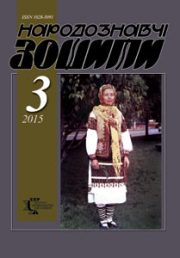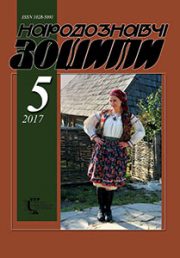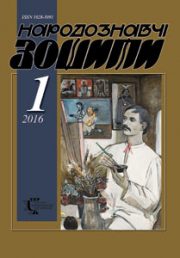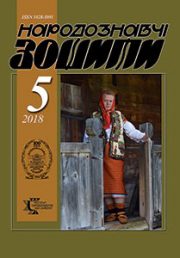The Ethnology Notebooks. 2021. № 4 (160), 775—782
UDK[94:328.1/.3](44:477)”1990/1996″(062.371):321.011(477)
DOI https://doi.org/10.15407/nz2021.04.775
UKRAINIAN SOVEREIGNTY THROUGH THE PRISM OF MEETING RECORDS OF THE FRENCH NATIONAL ASSEMBLY
SYPKO Bogdana
- ORCID ID: https://orcid.org/0000-0002-3136-9340
- Candidate of History, docent,
- The Ivan Franko National University of Lviv,
- Department of Modern and Contemporary History of Foreign Countries,
- 1, Universytetska str., 79000, Lviv, Ukraine,
- Contacts: е-mail: bogdanasypko@gmail.com
Abstract. Introduction. The collapse of the Soviet Union shook the established world geopolitical balance. The appearance in the center of the continent of independent Ukraine that had significant human and natural resources, powerful nuclear arsenal and a landmark location between the West and the Russian Federation, called the interest, and sometimes fear of french politics
Problem Statement. The article analyzes the attitude of French deputies to the first steps of the new Ukrainian state on the basis of the records of the meetings of the French Republic’s National Assembly.
Purpose. The documents of 1990—1996, which cover the period between the issuance of the Declaration of State Sovereignty of Ukraine and the ratification of the Agreement on Mutual Understanding and Cooperation between Ukraine and the French Republic, are considered. The main emphasis is on identifying the topics that most interested French parliamentarians in the context of the «Ukrainian question».
Methods. The general scientific methods of analysis and synthesis, as well as special scientific comparative-historical and chronological methods are used in the work. The author adheres to the principle of historicism.
Results. It is established that the approaches of IX (1988—1993) and X (1993—1997) legislatures, in which the majority had «left» and «right» did not differ fundamentally. The issue of Ukraine was not a priority for the Republic, it was discussed only in the context of French interests: the problem of nuclear security (both weapons and peaceful atom), the buffer zone between the Russian Federation and the West, potential markets for French products, and a large population, which can be involved in the French sphere of influence, primarily through the activities of cultural centers and French Alliances.
Conclusion. The long delay in ratifying the Treaty on Mutual Understanding and Cooperation is due to the wait for Ukraine to become «safe» (acceding to the Treaty on the Non-Proliferation of Nuclear Weapons on December 5, 1994) and «reliable» (joining the Council of Europe on November 9, 1995).
Keywords: independence, National Assembly, records of meetings, Ukraine, French Republic.
Received 28.07.2021
REFERENCES
- Zlenko, A., Zhukovs’kyj, A., Koptilov, V., & Manzhola, V. (2001). Ukraine and France: Essays on the Centuries-old History of Relations.Lviv: Svitlo i Tin’ [in Ukrainian].
- Donchenko, Y. (2010). Ukraine in the Eastern European policy of France (1991—2009). International relations of Ukraine: scientific research and discoveries, 19, 277—284 [in Ukrainian].
- Serov, R. (2018). Ukrainian-French Relations — Political Dimension in Historical Retrospective. Politykus, 51, 15—25. DOI: https://doi.org/10.24195/2414-9616-2018-5-6-15-25 [in Ukrainian].
- Durman, O. (2019) Analysis of Formation of Foreign Policy of Ukraine: a Historical Aspect. State and Regions, 68, 22—29. DOI: https://doi.org/10.32840/1813-3401-2019-4-4 [in Ukrainian].
- Bilenchuk, P. (Ed.). (2009). Ukraine-France: Contractual Framework for Humanitarian and Legal Relations: A Textbook. Kyiv: Kyj [in Ukrainian].
- (1990). Full report. 1st meeting of Thursday, October 11, 1990. JORF, 63, 3597—3629 [in French].
- (1990). Full report. 2nd meeting of Thursday, November 8, 1990. JORF, 80, 4970—4998 [in French].
- (1991). Full report. 1st meeting of Tuesday, November 5, 1991. JORF, 88, 5473—5491 [in French].
- (1991). Full report. 2nd meeting of Tuesday, November 5, 1991. JORF, 88, 5495—5511 [in French].
- (1991). Full report. 3rd meeting of Wednesday, November 13, 1991. JORF, 93, 5919—5959 [in French].
- (1991). Full report. 1st meeting of Thursday, December 12, 1991. JORF, 115, 7646—7679 [in French].
- Statement of Understanding and Cooperation between Ukraine and the French Republic. Retrieved from: https://zakon.rada.gov.ua/laws/show/ 250_344#Text (Last accessed: 03.04.2021) [in Ukrainian].
- (1992). Full report. Meeting of Thursday, April 30, 1992. JORF, 22, 823—832 [in French].
- (1992). Full report. 2nd meeting of Tuesday, May 5, 1992. JORF, 23, 857—885 [in French].
- (1992). Full report. 2nd meeting of Wednesday, May 6, 1992. JORF, 24, 913—943 [in French].
- (1992). Full report. 1st meeting of Friday, June 19, 1992. JORF, 51, 2594—2631 [in French].
- Document Presenting the Treaty Signed Between France and Ukraine on Cooperation Between the Two Countries, Paris June 16, 1992. Retrieved from: https://www.vie-publique.fr/discours/130624-document-de-presentation-du-traite-signe-entre-la-france-et-lukraine-su (Last accessed: 07.04.2021) [in Ukrainian].
- (1995). Full report. Meeting of July 26, 1995. Paris: Assemblee Nationale [in French].
- (1995). Report № 47 by Mr. Yves Guena, made on behalf of the Foreign Affairs Committee. Paris: Senat [in French].
- (1996). Full report. Meeting of February 14, 1996. Paris: Assemblee Nationale [in French].
- Speech by Mr. Jacques Chirac, President of the Republic, on Franco-Ukrainian Bilateral Relations, the Consolidation of Democracy and the Rule of Law and European Security, Kyiv on September 3, 1998. Retrieved from: https://www.elysee.fr/jacques-chirac/1998/09/03/discours-de-m-jacques-chirac-president-de-la-republique-sur-les-relations-bilaterales-franco-ukrainiennes-la-consolidation-de-la-democratie-et-de-letat-de-droit-et-la-securite-europeenne-kiev-le-3-septembre-1998 (Last accessed: 10.04.2021) [in French].







